By Mohamed Abdulzaher of Zawya
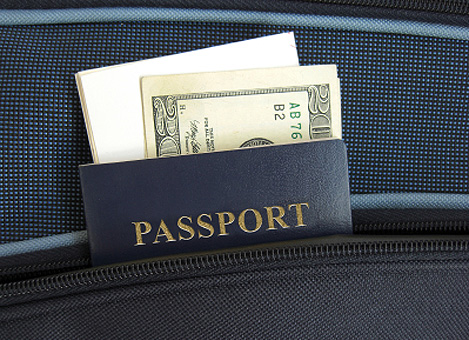
The loss of tourism traffic to Egypt, Syria, Yemen and Morocco in 2011 was a gain for other countries such as Turkey, the UAE and some South East Asian nations. Arab destinations were adversely affected by the Arab Spring revolutions as tourists switched their focus to relatively safe places.
Eastern and western Arab countries recorded 11% and 13% decreases, respectively, in tourist inflows in a period when global tourism witnessed an increase of 5.2%, according to the United Union World Tourism Organization (UNWTO).
The Arab Tourism Organization reported an increase of 80% in the number of Arab tourists visiting Turkey compared to 2010. On the other hand, Arab Spring countries recorded a sharp decline in the number of Arab and foreign tourists. Syria, Egypt and Lebanon, which played host to about 1.5 million Saudi tourists annually, saw the traffic move to destinations like Malaysia, Turkey and North America. The number of tourists visiting Egypt fell by 60% in 2011, while the number of tourists visiting Syria declined by 70%.
Egypt
The 25 January Revolution took its toll on tourism inflows; as soon as the dust started to settle, however, armed robberies in tourist destinations, demonstrations in Cairo streets, the Port Said Massacre and the kidnapping the two American tourists delivered a second blow to Egypt.
The Egyptian Central Agency for Public Mobilization and Statistics said that during the second quarter of 2011, 2.2 million tourists visited the country, compared to 3.5 million in the same quarter of 2010, a decline of 35.4 %.
The number of tourist nights during the quarter dropped 35.4% to 21.8 million, a drop of 35.4% , compared to the same period of 2010 which amounted to 33.7 million nights .
Egypt’s tourism minister Dr. Mounir Fakhri Abdel Nour admitted that tourism has faced problems after the January Revolution. Tourism started to recover after the crisis, he said, but the recovery is less than expected.
Dr. Salah Gouda, professor of economics at Ain Shams University and the manager of the Economic Studies Centre, says that tourism sector is one of the sector most impacted by the Port Said events and the subsequent ones as many transport reservations are cancelled reaching 40%, thus dramatically affecting the sector in addition to the impact on the internal tourism as well .
Elhamy Elzayat , head of the Egyptian Tourism Federation , said in an earlier statement that tourism sector is suffering from many crises after the Revolution on the head of which comes security represented in the protection of touristic establishments and roads . He pointed out that the Egyptian Tourism Federation is optimistic about the future of tourism not as promoted by mass media that this sector will relapse.
According to a recent report issued by the Egyptian Planning Ministry about the development of the economic sectors in the first quarter of the financial year (2011-2012), sectors ‘ trend is to lower its production rates. Thus, the production rate of tourism, building and transformation industries is converted from positive growth rate during the counterpart quarter of 2010/2011 to a negative growth rate. In addition, the growth rate of the remaining sectors dramatically declined whereas the agriculture sector is the only sector that tended to the increase by 2.9% versus 3.1% respectively. On the aggregate level, the growth rate lowered from 5.5 % to 0.3% respectively.
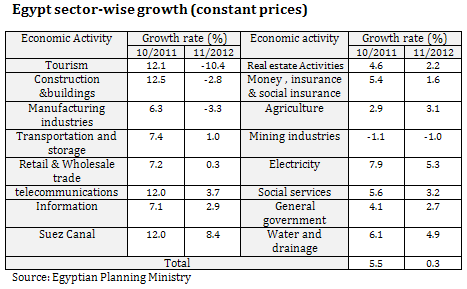
It is obvious that there is huge decline in the contribution of manufacturing industry, construction and building, tourism and mining activities (petrol and natural gas) in the economic growth whereas agriculture sector is the significant contributor in economic growth.
The report adds that tourism movement recedes witnessing a drop in the number of tourists during the first quarter of the follow-up year, compared to the corresponding period of the previous year. The biggest drop was in June reaching more than 350,000 visitors against 230,000 and 270,000 visitors in August and September respectively. This implies decline rates of 28%, 21% and 23% respectively.
The impact of this decline in visitors’ number appears in the number of touristic nights and returns in August whereas the impact was relatively less in July although the decline in visitors’ numbers was more.
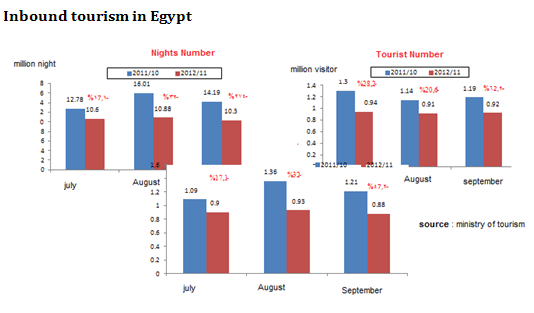
UAE
More than 10.5 million tourists, who spent more than one night, visited the UAE during 2011. A report of the Global Tourism Organization, issued at the beginning of January, emphasized that the UAE has maintained growth rate in the number of tourists despite the decline rate of 8% witnessed in the Middle East during 2011.
Experts said that the political disorders in some of the Arab countries have contributed in the conversion of tourism trends from such traditional stations to the UAE which provides the tourist with super services in hotels, transportations and shopping.
Visitors from GCC countries take the biggest share in the occupation of hotels in Dubai during the past year especially in vacations. According to the estimations of the experts of tourism and travel sector, more than 250,000 of them entered to Dubai by road and air from the beginning of the mid-term vacation in Saudi Arabia in January.
Dubai department of tourism and trade marketing indicates that about 1.19 million tourist from GCC countries Council visited Dubai during the first nine months of 2011. Touristic nights in this period amounted to 24 million guests with an increase of 26% compared to the corresponding period of the last year.
A report about indications of hotels performance prepared by Ernst & Young shows that Dubai hotels witnessed the highest occupation rate in February 2011 that exceeds 90%. The rate of hotel rooms per night fluctuates between USD 267 and USD 147 during the period from November 2010 to November 2011.
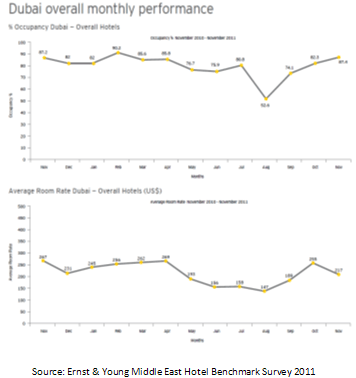
Expectations of recovery in the hospitality market in Dubai continue compared to the traditional Arabic markets like Egypt and Lebanon. Hotel and retail sector recovers during Dubai Shopping Festival events in the period between January and February 2012. Moreover, Visa Foundation announced that it has achieved record results during the Festival especially in the first week as Dubai visitors spent about USD 114 million during this period, USD 19 million of which were spent in one day on January 6.
Dubai joined the destinations that benefited from the Arab Spring. Jones Lang LaSalle said that hotel occupation rates in Abu Dhabi reached 65% approximately in the last year achieving performance recovery, compared to 2010 noting that growth volume of revenues from hotel rooms for the last year increased by 7.2% in Abu Dhabi.
A recent report by MasterCard indicates that Abu Dhabi was ranked the seventh in the list of touristic destinations in Middle East and North Africa in terms of tourists’ expenditures from around the world in 2011.
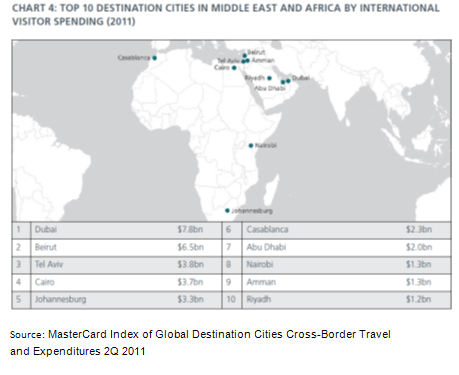
Dr. Sabri Abdel Samie, a professor in the faculty of Tourism and Hotels, Helwan University, emphasizes that the change in Arab tourism destinations is a normal matter as a result of the Arab Spring revolutions. He added that this is normal and well known all over the world. Being one of the most sectors susceptible to the events, tourism does not flourish in the absence of security and safety in any country.
He suggests Arab countries do not depend mainly on tourism which is exposed to many fluctuations due to any event, not only revolutions and absence of security as the matter in some Arab countries.
He calls for the need for cooperation of the Arab countries to boost tourism and benefit from the advantages they have, pointing out that the Arab cooperation in touristic field is not significant and controlled by the political affairs. He criticized the Arab countries which ask their citizens not to travel to the countries that witness revolutions. “Marketing campaigns which promote for tourism in Arab countries should not stop and prices should be lowered in order to attract both Arab and foreign tourists especially that prices are high despite the decrease in tourists numbers,” said Sabry.
Hanafy Awad, an expert in the capital market, said that touristic companies shall not play any role in returning tourism to its previous position before Arab Spring revolutions and the matter depends on governments which should return stability and security to such countries pointing out that tourism industry is closely related to security and stability.
“The situation is bad due to the absence of security. Any tourist can’t be forced to go to the Arab revolutions area so long as there are cases of kidnapping for some tourists in such countries, besides, countries cannot expose their foreign nationals to risks in light of the current events. All parties should cooperate in favor of stability and return of security,” added Hanafy.
Morocco
The growth rate of tourism sector in Morocco decreased by 6% during the first half of 2011 compared to the growth rate recorded during the same period of 2010, according to the website of the ministry of tourism.
Morocco Planning Commission experts said in one of its recent reports that the touristic activity in Morocco shall witness a boom during the year 2010 based on “the encouraging prospects of the World Tourism Organization”. The tourism sector shall resume its normal growth due to the stability of the country.
According to a report of Oxford Business Group, the tourism sector in Morocco has recorded during the current year significant growth despite of the slight decline of demand by Europe as well as the political turmoil in the region.
Growth is achieved thanks to the new foreign investments that double the hotel offers.
Mohamed Nagat, an investor, said local tourism should be encouraged through providing special offers and decreasing the prices. He sees that the Arab Spring adversely affected Morocco in terms of tourism “but we will depend on the new Islamic government in finding urgent solutions to develop the Moroccan tourism and increase investment in this field”.
Dr. Zaher Mohamed Zaher, a businessman and investor in the tourism sector in Egypt, believes that the change of destinations is a temporary one. As soon as security returns to the Arab streets, especially Egypt, tourism investments will recover and Egypt will be more attractive than before, he said.
Dr. Zaher added that the recovery of tourism in Egypt depends mainly on two basic conditions. “The first one is security which must be present especially in touristic places. The second condition is that the Egyptian government must transparently declare the financial situation of Egypt and refrain from frightening investors by its statements about the deterioration of the economic condition and the country is on the verge of economic collapse. All these are factors that make investors go to other neighboring counties.
“I am still investing in tourism in Egypt as I established a great resort in the North Coast region, Aida Village. I am quite certain of the usefulness of touristic projects in Egypt now,” he said.
The following writers contributed to this article:
Samira Hadi, Mohamed Al Agamy, Ayman Younis, Hafiza Al Delemi.
.






